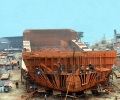
[ad_1]

Korea Shipbuilding & Offshore Engineering (KSOE) is expected to secure an order to build container ships using methanol as a fuel from Maesk, the world’s largest container ship service operator.
Hyundai Mipo Dockyard, a subsidiary of KSOE, recently signed a letter of intent (LOI) with Maesk to build three 3,500-TEU methanol fuel-powered container ships (including optional units). The company did not disclose details about the ships’ price and shipbuilding schedule. Industry insiders predict that the value of each ship will run between 45 billion won to 50 billion won. If Hyundai Mipo Dockyard builds all the three ships, the total contract value will reach 150 billion won. Both companies are reportedly planning to seal the contract soon. Maesk made the order for the methanol-powered container ships based on its plan to introduce carbon-neutral ships by 2023, analysts say.
Regarding the signing of the LOI, industry insiders are paying attention to the fact that the methanol-powered vessel market is in full swing rather than to the amount of the orders. Methanol is considered an eco-friendly fuel for ships following liquefied natural gas (LNG) as it can reduce sulfur oxides 99 percent, nitrogen oxides 80 percent and greenhouse gas emissions 25 percent. Until now, methanol has not been used as a ship fuel because of its high production cost and nitrogen oxide emission.
However, increased production of natural gas, the main ingredient, has pruned cost for production of methanol and new fuel injection technology reduces nitrogen oxides, thereby making it a valuable next-generation fuel for ships. In particular, unlike LNG, which requires high pressure and cryogenic temperatures, methanol is easy to store and transport even at room temperature and general atmospheric pressure. To top it off, construction cost for initial methanol infrastructure is relatively low. Even if it is discharged into the sea, it melts quickly in water and does not cause marine pollution.
In addition, the Korean Ministry of Oceans and Fisheries finally approved a revision to the Korean Register of Shipping’s Rules on Low Flash Point Fuel-Based Ships on June 18. The revision changed the inspection criteria for methanol-powered ships. The ministry made the decision in line with the global trend as the International Maritime Organization (IMO) prepared temporary safety guidelines on methanol- and ethanol-powered vessels in December 2020.
This will allow Korean shipbuilders to build methanol-powered ships more quickly and stably. Currently, more than 20 methanol-powered ships are in operation around the world, with eight of them built by Hyundai Mipo Dockyard.
Source: Business Korea
[ad_2]
This article has been posted as is from Source